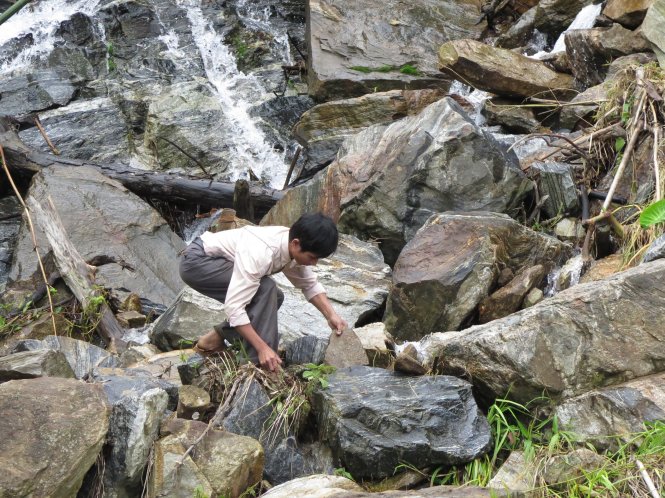Initially arranging slabs of stone and clubs eroded by the movement of water to create sounds to prevent wild animals from destroying farms, a man living on the peak of Truong Son chain, which runs parallel to the Vietnamese coast, has ‘elevated’ his work to make lithophones.
Ho Van Thap, 50, lives in Nam Tra My District in the central Vietnamese province of Quang Nam.
Thap’s village is located on the peak of Ngoc Linh, the highest mountain of the Truong Son range running from north to south as the backbone of Vietnam.
It is believed that he is the last artist of the ethnic minority people of Xe Dang, who are able to make natural lithophones in this manner.
Actually, dan da (lithophone) is an ancient musical instrument believed by researchers to have existed between 4,000 and 10,000 years ago.
It takes a three-hour drive and a one-hour walk from the center of Nam Tra My District to reach the peak of Ngoc Linh Mountain, which is home to Mang To Village in Tra Cang Commune.
Thap’s house is located on the highest hill of the village, sided by chains of mountain Ngoc Di and Con No, covered with terraced rice fields and wild forests.
One day Thap received a Tuoi Tre (Youth) newspaper journalist with baked white potatoes and a jar of ruou can in the middle of his house on stilts.
Ruou can is a traditional wine of highlanders domestically produced with mixed ingredients such as wild leaves, white potatoes, rice, and pure water from local streams. It is left for natural fermentation in two weeks before drinking.
Under the light influence of the self-made wine, Thap agreed to play some Laotian, Champa, and more local Xe Dang rhythms with his self-made lithophone, commonly called T’rung.
Thap admitted he had never been taught music theory but could still make the lithophone because of his preference to enjoy his work.
At the early age of six, his father left him alone to prevent farms and rice fields from being destroyed by wild animals.
“Then, wild boar and deer traveled in big herds to enter farms and didn’t fear people,” he recalled.
His father showed him how to arrange slabs of stone and clubs using the power of the running water in a nearby stream.
“The sounds make wild animals panic and run away,” he said.
Watching the movements of clubs on stone slabs, the romantic man decided to create a lithophone then.
After each forest rain, he wandered around in forests and along the banks of local streams to search for stone slabs that could create the desired sounds.
From hundreds of stone slabs selected, he used 12 to create a small lithophone after many years of search.
“Sometimes I have to adjust the sound of a stone slab by filing it to become thinner or smaller,” Thap said.
“In general, I can only find a stone slab with the exact sound I want after looking at hundreds of slabs.”
He can use his lithophone to play some songs after he heard them from his radio and learnt them by heart.
Thap has become famous for his self-made lithophones and has traveled around the nation to give performances, from Hanoi in the north, Ho Chi Minh City in the south, to Kon Tum, Binh Dinh and Da Nang in the central region.
“I visited Hanoi and drank beer there,” he said.
“Hanoi is overcrowded with an abundance of people moving as water flows through a stream.
“I can’t stay there.”
Thap has been awarded many certificates of merit for his contribution to the progress of ethnic music.
“I would have died with two previous wives because of poverty and hardship if I had no love for music,” Thap said.
“Music makes my soul relaxed and calm.”
Duong Trinh, music composer and head of the culture and information department in Nam Tra My District, said the uniqueness of his lithophone is that it is completely manually made.
It was not processed by cutting machines so it produces a unique natural sound, he added.
Like us on Facebook or follow us on Twitter to get the latest news about Vietnam!





















































